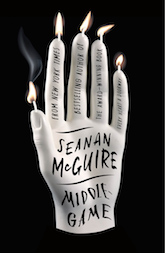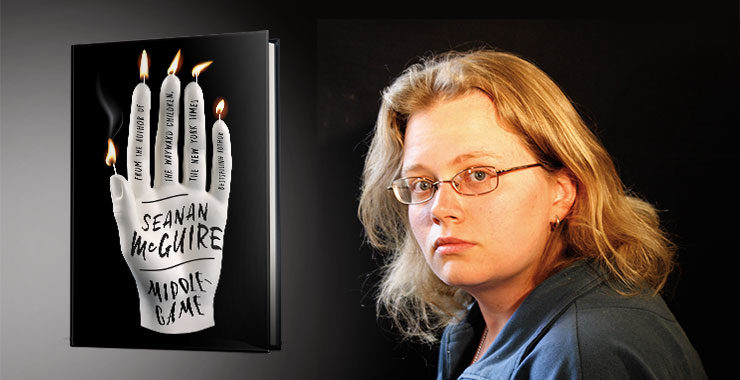Meet Roger. Skilled with words, languages come easily to him. He instinctively understands how the world works through the power of story. Meet Dodger, his twin. Numbers are her world, her obsession, her everything. All she understands, she does so through the power of math. Roger and Dodger aren’t exactly human, though they don’t realise it. They aren’t exactly gods, either. Not entirely. Not yet.
Meet Reed, skilled in the alchemical arts like his progenitor before him. Reed created Dodger and her brother. He’s not their father. Not quite. But he has a plan: to raise the twins to the highest power, to ascend with them and claim their authority as his own.
Godhood is attainable. Pray it isn’t attained.
Author Seanan McGuire introduces readers to a world of amoral alchemy, shadowy organizations, and impossible cities in the standalone fantasy, Middlegame, out from Tor.com Publishing on May 7th. Read Part One below, and stay tuned for additional chapters soon!
BOOK VII
The End
They say there is divinity in odd numbers,
Either in nativity, chance, or death.—William Shakespeare, The Merry Wives of Windsor
It doesn’t matter how beautiful your theory is, it doesn’t matter how smart you are. If it doesn’t agree with experiment, it’s wrong.
—Richard Feynman
Failure
TIMELINE: FIVE MINUTES TOO LATE,
THIRTY SECONDS FROM THE END OF THE WORLD.
There is so much blood.
Roger didn’t know there was this much blood in the human body. It seems impossible, ridiculous, a profligate waste of something that should be precious and rare—and most importantly, contained. This blood belongs inside the body where it began, and yet here it is, and here he is, and everything is going so wrong.
Dodger isn’t dead yet, despite the blood, despite everything. Her chest rises and falls in tiny hitches, barely visible to the eye. Each breath is a clear struggle, but she keeps fighting for the next one. She’s still breathing. She’s still bleeding.
She’s not going to bleed for long. She doesn’t, no pun intended, have it in her. And when she stops breathing, so does he.
Buy the Book


Middlegame
If Dodger were awake, she’d happily tell him exactly how much of her blood is on the floor. She’d look at the mess around them. She’d calculate the surface area and volume of the liquid as easily as taking a breath, and she’d turn it into a concrete number, something accurate to the quarter ounce. She’d think she was being comforting, even if the number she came up with meant “I’m leaving you.” Even if it meant “there is no coming back from this.”
Even if it meant goodbye.
Maybe it would be comforting, to her. The math would be true, and that’s all she’s ever asked from the world. He knows the words that apply to this situation—exsanguination, hypovolemia, hemorrhage— but they don’t reassure him the way the numbers reassure her. They never have. Numbers are simple, obedient things, as long as you understand the rules they live by. Words are trickier. They twist and bite and require too much attention. He has to think to change the world. His sister just does it.
Not without consequences. That’s how they wound up here, on the other side of the garden wall, at the end of the improbable road, at the end of everything. They never got to the Impossible City, and now they never will. The King of Cups wins again.
The King of Cups always wins. Anyone who tries to say he doesn’t is lying.
The gunfire from outside is louder and less dramatic than he expected, like the sound of someone setting off firecrackers inside a tin can. Firecrackers never did this sort of damage. The walls are thin and getting thinner. The bullets are chewing the concrete away, and the people who followed them down the improbable road will be inside soon. Erin can’t hold them off forever, no matter how hard she tries.
Dimly, he realizes he doesn’t want her to hold them off forever. If this is where it ends for one of them, let this be where it ends for all of them. Let this be where it ends for good. No one—not even him— walks the improbable road alone.
He grasps Dodger’s shoulder, feeling the solidity of her, the vital, concrete reality of her, and shakes as gently as he can. “Dodger. Hey, Dodge. Hey. I need you to wake up. I need you to help me stop the bleeding.”
Her eyes stay closed. Her chest rises and falls, her breathing getting shallower all the time.
There’s so much blood.
He knows the words. Shock; fatality; the brutally simple, brutally accurate death. She’s leaving him again, forever this time. Going. Going. Gone.
“Don’t do this to me.” His own injuries aren’t as bad as hers. He took a single bullet to the upper thigh early on in the battle. It was through and through, missing the major arteries, and Dodger was still alert enough to help him with the tourniquet. There’s still a chance he could lose the leg if he doesn’t get proper medical attention soon. Right now, that doesn’t seem important. Maybe he’s in shock too. Maybe he deserves to be. “You can’t. You can’t go. We’ve come too far. Are you listening? You can’t go. I need you.”
Her eyes are closed. There’s so much blood.
There’s one thing he can do. Maybe the only thing. Maybe it was always the only thing, and they’ve been building toward this the whole time. It feels like failure, like running back to the garden, and he doesn’t care, because her chest is barely moving, and there’s so much blood, there’s so much blood, and it doesn’t matter that he knows the words, all the words, for everything. The numbers are taking her away. He can’t reach them without her.
“I can’t do this alone. I’m sorry. I can’t.”
He leans in until his lips brush the seashell curve of her ear. There’s blood in her hair, turning it tacky and clinging. It sticks to his skin, and he doesn’t try to wipe it off.
“Dodger,” he whispers. “Don’t die. This is an order. This is a command. This is an adjuration. Do whatever you have to do, break whatever you have to break, but don’t you die. This is an order. This is—”
This is her eyes opening, pupils reduced to black pinpricks against the gray of her irises, until she looks like she’s suffered a massive opiate overdose. This is gold sparking in the gray, brief and bright, as the Impossible City tries to call her home. He feels the gold in his own bones respond, reaching for the gold in Dodger’s, yearning to reunite.
This is the sound of gunfire going silent. Not tapering off; just stopping, like the world has been muted.
This is the world going white.
This is the end.
We got it wrong we got it wrong we got it wrong we got it wrong we
In the same ordinary town, on the same ordinary street, lived two ordinary children who had never quite managed to cross paths. This, too, was sadly ordinary, for the line that divided the students who went to the school on the west side of town from the students who went to school on the east side of town ran right down the middle of their block, an invisible barrier that had split them in two before they were old enough to notice. Every morning they got out of bed, put on their clothes, kissed their parents goodbye, and walked off down their ordinary street, through their ordinary town, in two ordinary, opposite directions.
The two children were very much alike and very different at the same time, as children so often are. One was named Hephzibah, because her parents had a languid and eccentric way of looking at the world. They called her “Zib,” understanding that “Hephzibah” was more name than she had shadow. Every day they watched for signs that she was growing into her name, and every day they were disappointed.
“Soon,” they promised each other. “Soon.”
The other was named Avery, because his parents had a sharp and efficient way of looking at the world. They called him “Avery” when they were happy, and “Avery Alexander Grey” when they were mad, and gave him no nicknames. Nicknames were for people whose names didn’t fit them properly, and they had measured him, every inch, before they named him.
“We did well,” they reassured each other. “We did.”
These are our two children: ordinary, average, wildly unique, as all children are. Our story begins on an ordinary, average day, a day which had never happened before, and would never, in all the length and breadth of time, happen again…
—From Over the Woodward Wall, by A. Deborah Baker
… the Doctrine of Ethos, as described by Pythagoras, held that certain musical instruments and modes could influence the balance between Logos (rational behavior) and Pathos (emotional thought). Later alchemists came to see this as the interaction between the two halves of the human heart, and more, as the balance between language and mathematics: the two methods through which Man has always been able to influence and even command Nature. The Doctrine must thus be viewed as the most dangerous and most desirable of alchemical incarnations. The people who are first able to seize control over the Doctrine shall command all things.
Ladies and gentlemen of the Alchemical Congress, you know what I am capable of. You have seen my masterwork, spoken to the proof of my mastery. I believe I am prepared to incarnate the Doctrine, if you are prepared to let me try.
—Address by Asphodel D. Baker to the American Alchemical Congress, 1901.
Excerpted from Middlegame, copyright © 2019 by Seanan McGuire.










